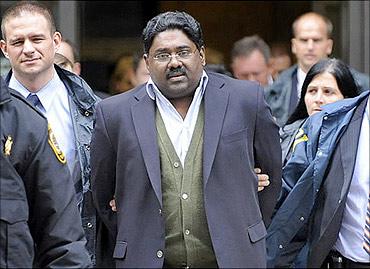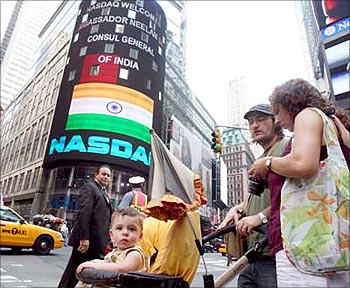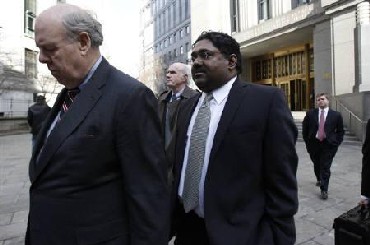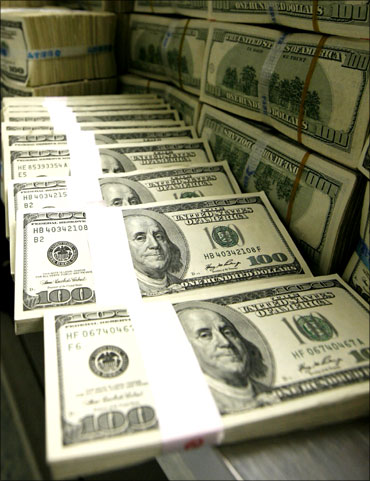
In what was seen as a strong warning message to Wall Street, a United States District Court last week sent former hedge-fund billionaire Raj Rajaratnam, convicted in May this year in Wall Street's biggest insider trading case, to 11 years in prison, the longest so far involving insider trading in the US.
US District Judge Richard Holwell said while ordering the sentence in a downtown Manhattan courthouse that Rajaratnam's crimes and their scope reflect a virus 'in our business culture' that needs to be eradicated.
In addition to his prison term, Rajaratnam was ordered to pay a fine of $10 million, and to forfeit $53.8 million. He was also sentenced to two years of supervised release.
The sentence -- which some legal considered light -- seemed to be the result of the consideration by the court that Rajaratnam, 54, was apparently in poor health and despite being on the wrong side of the law, had contributed over the years to charities and for benevolent activities.
. . .

The Sri Lankan native, who founded the erstwhile Galleon Group, was unanimously found guilty by a jury -- comprising eight women and four men -- on all 14 counts of conspiracy and securities fraud with which he was charged. The sentence followed an eight-week jury trial in the largest insider case involving a Wall Street hedge fund founder.
Preet Bharara, US attorney for the Southern District of New York, had asked for a prison term of at least 20 years for Rajaratnam. But Bharara, whose team vigorously fought the case for over two years against Rajaratnam's illustrious attorney John Dowd, did not seem disappointed.
'Two years ago, Raj Rajaratnam stood at the summit of Wall Street, commanding his own financial empire,' Bharara said in a statement after Judge Holwell announced the sentence. 'Then he was arrested, tried, and convicted by a jury. Mr Rajaratnam stood convicted 14 times over of felonies, his empire exposed as a web of fraud and corruption that entangled many. Today, Mr Rajaratnam stood once more and faced justice which was meted out to him. It is a sad conclusion to what once seemed to be a glittering story. We can only hope that this case will be the wake-up call we said it should be when Mr Rajaratnam was arrested. Privileged professionals do not get a free pass to pursue profit through corrupt means. The message is the same for everyone no matter who you are or how much money you have -- obey the law or face the fate of those who don't.'
The 14 counts on which Rajaratnam was convicted included five counts of conspiracy and nine counts of securities fraud. That included conspiracies with Rajiv Goel of Intel, Anil Kumar of McKinsey and Roomy Khan, formerly of Intel who worked for Rajaratnam.
. . .

The jury evidently concluded that Rajaratnam traded on material, non-public information that he got from tippers in corporate entities and not 'confidential information', as the defense argued. The jury also did not fall for the defense's 'mosaic theory' argument that sought to establish in the court that Rajaratnam based his trading decisions after analysis and research of publicly available information and not on insider tips.
Attorneys familiar with the case had said earlier that Rajaratnam's conviction will have an impact on the would-be-violators of government rules governing legal trading.
'The message the prosecutors will want the financial community to take away from this verdict is that Wall Street is on notice,' said Attorney Greg Little, White & Case Partner and former Securities and Exchange Commission trial attorney. 'Trade on inside information, and you better start worrying about whether prosecutors are listening. This goes for the most junior employee as well as the most senior officer. This is a significant victory for the US attorney's office and the SEC, and sends a potent reminder to Wall Street, hedge fund traders and executives in companies actively involved in US capital markets that there are many ways for authorities to uncover illegal activity, including recording telephone conversations.'
During the sentencing proceedings October 13, Judge Holwell said insider trading 'is an assault on our free markets.'
. . .

The Rajaratnam case attracted banner headlines. On sentencing day, the courtroom was packed with journalists.
'Mr Rajaratnam, wearing a dark suit with a blue-and-silver striped tie, showed no emotion as the sentence was announced. He turned to face the audience, clutching a water bottle to his chest, as the courtroom was cleared following the sentencing,' The Wall Street Journal reported.
"There are people on Wall Street that need diapers, and on Main Street a sad jubilation that we are indeed a nation of laws," Manhattan-based criminal attorney Ravi Batra told India Abroad. "And Rajaratnam was a low boy of that lofty crew who fancy themselves above the law and sovereignty."
Bill Currier, a White & Case partner and a former assistant US attorney and SEC assistant director, said Rajaratnam's sentencing 'should serve as a sober reminder to the financial sector and corporate executives that law enforcement officials are watching the markets closely, looking for evidence of illegal trading activity. The evidence of widespread, improper conduct presented in the Rajaratnam case and the related prosecutions of others who chose to share confidential financial information with Rajaratnam caused substantial damage to the credibility of the financial markets.'
. . .

Currier said it is important for senior officials in the financial sector, and those in publicly traded companies, to advise officers, directors, and employees that insider trading exposes individuals and enterprises to serious adverse consequences.
Judge Holwell recommended that Rajaratnam be sent to Butner Federal Correctional Complex near Raleigh, North Carolina, which has a medical facility, in view of the convict's health conditions that include kidney problems.
But legal experts told Rediff.com that a judge can only recommend which prison facility one should be sent to but the ultimate decision is to be taken by the Bureau of Prisons.
Rajaratnam, who remains under house arrest, must report to prison November 28.